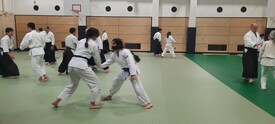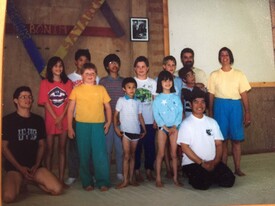Encourage and Welcome Young People in Seminars - Part 2

Youth Practicing at VWA Seminar March 2023
(scroll down for Part 1)
List of the Ideas and Comments Submitted - Part 2 of an article by Bruce Riddick, 5th dan, shidoin, on Encouraging Young People in Seminars.
These ideas are the fruit of brainstorming with Grant Babin, Jim Redding, Megan Sekiya and Martin Moreau in 2021. Some of the brainstorming ideas may be contradictory or simply unsuitable in an adult seminar, but they get our minds churning on that specific question.
Ideas and Comments
It is up to seminar organizers to judge to what extent our young people can participate in any specific event. It will depend on the age groups, differing regional preferences and considerations, the seminar schedule, and the facilities. There is no one formula.
- A good instructor needs to be able to relate to the students, but also the students need to be able to relate to them.
- Have youth volunteers running the reception with appropriate supervision.
- Have youth, young adults, take on leadership roles. Introductions, announcements, etc.
- Have a young kids class taught by an older teen or young adult.
Incorporate some aikido-based games into the adult classes. - Classes need to be fun, energetic, and depending on the age group you're after, may need to include game-like activities. The use of games to develop skills is the most effective.
- High energy, aerobic classes.
- LOTS of recognition: getting credit for classes attended (adults get one credit per day of training, whereas kids want to be recognized for each class they attend).
- Peer role models (other teens or young people teaching, or assisting in the classes)
- Social events outside of classes, or in the case of the seminar, having a party or hangout session afterwards.
- Young people need to really feel that the older practitioners really appreciate and want them there
- If you approach teaching kids the same way as an adult your success rate drops dramatically.
- Having a kids seminar at the same time but in a different room or location.
- Encourage adults to participate in classes or watch, to collect ideas on how to teach/relate to young people.
- Several instructors need to be used so the kids receive a variety of approaches to learning aikido.
- Avoid using the young people’s classes as teacher training grounds unless the young students are made aware that this is a teacher in training.
- All techniques need to be modified to accommodate the young student’s size, flexibility, joints etc. Absolutely no joint locks!
- Adults need to be reminded to stick to the forms as demonstrated, no variations, to be cautious and softer when working with younger people.
- Depending on the age and maturity of the young group, some may be integrated into the adult classes, others may need a separate parallel class on separate mats.
- Some youths may easily accommodate a seminar for adults, even at a younger age. There are exceptions to every rule and these people should be allowed to participate in adult seminars, but only on the recommendation of their chief instructor. Fewer special provisions may be needed for their inclusion.
- Have a separate young people’s instructor on the mats at the same time as the adult classes and their instructor will supervise the youngsters as well as modify the main instructor’s material to suit them.
- When youngsters are kept separate from the adults, have a special class where the younger students are included in an adult class and highlight them. Do techniques and exercises that everyone can do.
- Adjust the seminar fees for youngsters and the classes they participate in.
- Having something physical to take home is big. Stickers, badges, certificates, and mudansha books to collect stamps are great ways to engage younger students and keep them coming back for more.
- Provide advice for adults on how to greet and how to train with youths.
- Have groups of young people participate in an embukai at regional seminars.
- Organize regional seminars for young people only.
- Hold a separate social event for the young people after the seminar and have the main instructor drop in to visit them.
- Basic weapons classes.
Closing
There were several younger people at the September seminar in Victoria and I thoroughly enjoyed the opportunity to practice with them and learn more myself. They certainly contributed to the seminar’s success. More should come to the next one; let’s give them more recognition and opportunities.
